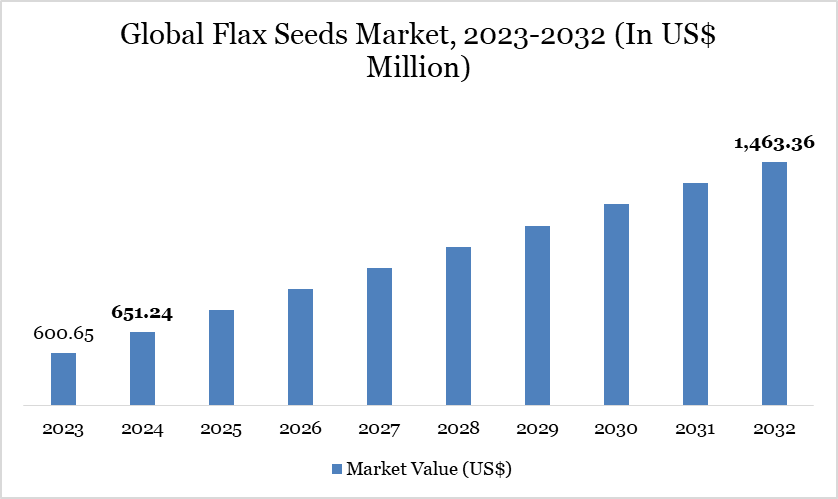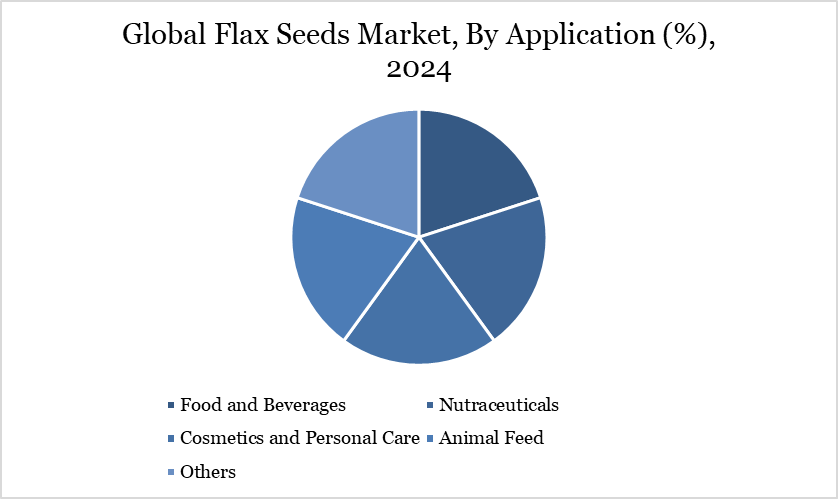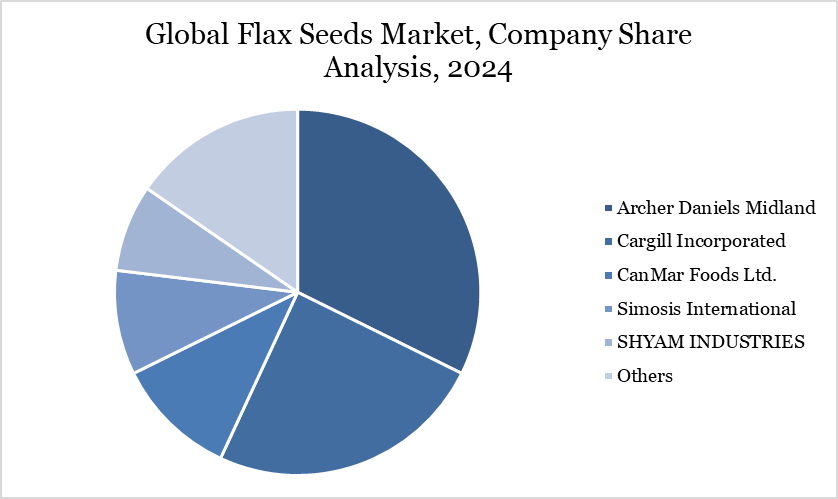Flax Seeds Market Overview
Global Flax Seeds Market reached US$ 651.24 million in 2024 and is expected to reach US$ 1,463.36 million by 2032, growing with a CAGR of 10.9% during the forecast period 2025-2032, according to DataM Intelligence report.
Innovations in processing and product development are further propelling the market, making flaxseed a valuable ingredient in various sectors, including food, nutraceuticals, animal feed, and personal care products. Supportive regulations and ongoing research continue to support this expansion, highlighting the significant potential of flaxseed in meeting evolving consumer needs.
North America dominates the global flaxseed market. The US's large flaxseed imports relative to its exports underline North America's significant role in the global flaxseed market. US imported 5,700 thousand bushels of flaxseed and exported only 200 thousand bushels as per USDA, 2023-34. The import and export figures for flaxseed in the US illustrate a significant aspect of North America's role in the global flaxseed market.
Flax Seeds Market Trend
The flax seeds market is witnessing robust growth driven by increasing consumer inclination toward plant-based and functional foods. One of the key trends is the rising demand for organic and non-GMO flax seeds, especially in developed regions like North America and Europe, where clean-label and sustainable food choices dominate consumer preferences.
For instance, companies like Manitoba Harvest and Bob’s Red Mill have introduced certified organic flaxseed products to cater to the health-conscious demographic. Another trend is the incorporation of flax seeds in various food and beverage formulations, including baked goods, cereals, smoothies, and plant-based protein bars. In 2024, Kellogg’s launched a new range of flaxseed-infused granola to boost the fiber and omega-3 content of breakfast offerings.

To know more insights Download Sample
Market Scope
Metrics | Details |
By Type | Whole Flaxseed, Ground Flaxseed, Flaxseed Oil, Flaxseed Meal |
By Form | Raw, Rosted, Refined, Cold-Pressed |
By Application | Food and Beverages, Nutraceuticals, Cosmetics and Personal Care, Animal Feed, Others |
By Distribution Channel | Supermarkets/Hypermarkets, Specialty Stores, Online Retail, Others |
By Region | North America, South America, Europe, Asia-Pacific, Middle East and Africa |
Report Insights Covered | Competitive Landscape Analysis, Company Profile Analysis, Market Size, Share, Growth |
Flax Seeds Market Dynamics
Growing Vegan Population
The expanding global vegan population is a significant driver of the flax seeds market, as consumers seek plant-based alternatives to meet their nutritional needs without relying on animal-derived products. Flax seeds serve as a crucial source of omega-3 fatty acids (specifically ALA), which are typically found in fish oils, making them an ideal choice for vegans looking to maintain heart and brain health.
For instance, in 2025, research by Veganuary calculated that approximately 25.8 million people globally tried veganism in January 2025. In 2022, The Good Food Institute reported that global retail sales of plant-based meat products were US$ 6.1 billion. The rise in vegan influencers and recipe bloggers has further popularized the use of flax seeds in smoothies, baked goods, and homemade plant-based meals. Thus, above factors helps to boost the market growth.
Production Issues of Flaxseed
Despite rising demand, production-related challenges significantly restrain the growth of the flax seeds market. Flax cultivation is highly sensitive to climatic conditions, with yields affected by unpredictable weather patterns such as droughts, floods, or unseasonal rains. These factors lead to inconsistent supply and price volatility, making it difficult for manufacturers to maintain stable production cycles.
For instance, in Canada—one of the world’s leading flaxseed producers—drought conditions in recent years have led to lower harvest volumes, impacting global exports and causing price surges. These factors collectively pose risks to scalability and profitability, restricting the overall market potential for flax seeds.
Flax Seeds Market Segment Analysis
The global flax seeds market is segmented based on type, form, application, distribution channel and region.

Health-Focused Consumption in F&B Sector Propels Flax Seeds Usage
The food and beverages segment is a primary driver of the flax seeds market due to the increasing consumer preference for health-oriented and functional ingredients in daily diets. Flax seeds are being widely incorporated into various food products such as breakfast cereals, bakery items, snacks, and dairy alternatives, owing to their high content of omega-3 fatty acids, dietary fiber, and plant-based protein.
Their versatility allows easy integration into both traditional and modern recipes, appealing to a broad consumer base ranging from health enthusiasts to individuals managing lifestyle-related conditions like obesity, diabetes, and cardiovascular issues. The growing awareness of clean-label and plant-based nutrition is pushing manufacturers to use flax seeds as a natural fortification ingredient. Additionally, the demand for high-fiber and gluten-free foods is further boosting the use of flax seeds in this segment.
Flax Seeds Market Geographical Share
North America Leads Global Flaxseed Market with Strong Production and Demand
North America dominates the global flax seeds market due to its strong agricultural base, high consumer health awareness, and a well-established functional food industry. Canada, in particular, stands as one of the world’s largest producers and exporters of flax seeds, benefiting from favorable climatic conditions and advanced farming practices. For instance, Canada is the largest producer of flaxseed in the world, representing about 40% of world production. China, the United States (US), and India, together account for 40% of world production.
Within the European Union (EU), the main producers of flaxseed are Germany, the United Kingdom and France. Moreover, North America's strong regulatory support for organic and non-GMO labeling has encouraged the growth of premium flaxseed offerings. These factors—combined with a robust distribution network, rising vegan and gluten-free trends, and high per capita health expenditure solidify North America’s leading position in the global flax seeds market.
Sustainability Analysis
The flax seeds market demonstrates strong potential for sustainability, both environmentally and economically, due to the crop's low input requirements and its role in promoting healthy diets. Flax is a hardy plant that grows well in cooler climates with minimal need for synthetic fertilizers or pesticides, reducing its environmental footprint compared to other oilseeds. Its ability to improve soil health through crop rotation and nitrogen fixation further supports sustainable agriculture practices.
Additionally, the processing of flax seeds generates minimal waste, with byproducts like flaxseed oil and meal used in food, animal feed, and industrial applications. From a consumer perspective, flax seeds contribute to sustainable nutrition by offering plant-based sources of omega-3s and protein, which are more environmentally friendly than animal-based alternatives.
Flax Seeds Market Major Players
The major global players in the market include Archer Daniels Midland, Cargill Incorporated, CanMar Foods Ltd., Simosis International, SHYAM INDUSTRIES, AG Organica, Flax Farm Ltd, Nature's Way Brands, The Scoular Company, Linwoods Health Foods, among others.

Key developments
In April 2022, Malibu Mylk, a California-based non-dairy beverage company, launched Flax Mylk, the world’s first high-fiber milk made entirely from whole organic flaxseeds.
In January 2022, Scoular launched a new high-speed flax processing facility in Regina, marking the first new flax plant in Western Canada.


